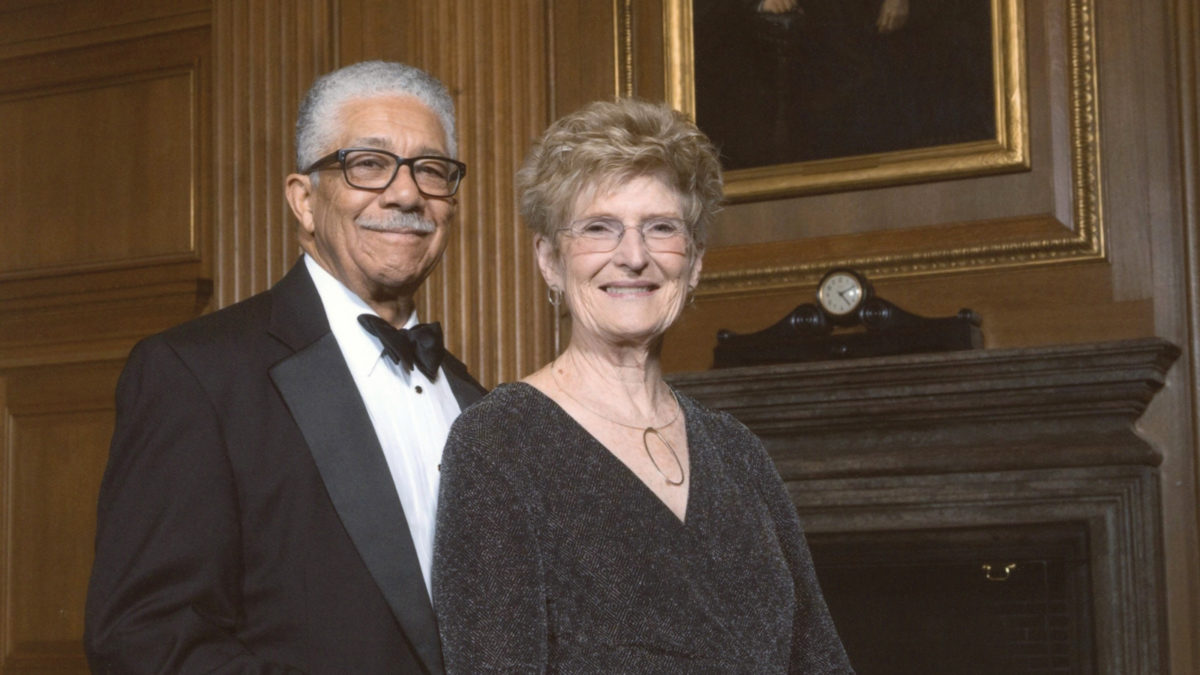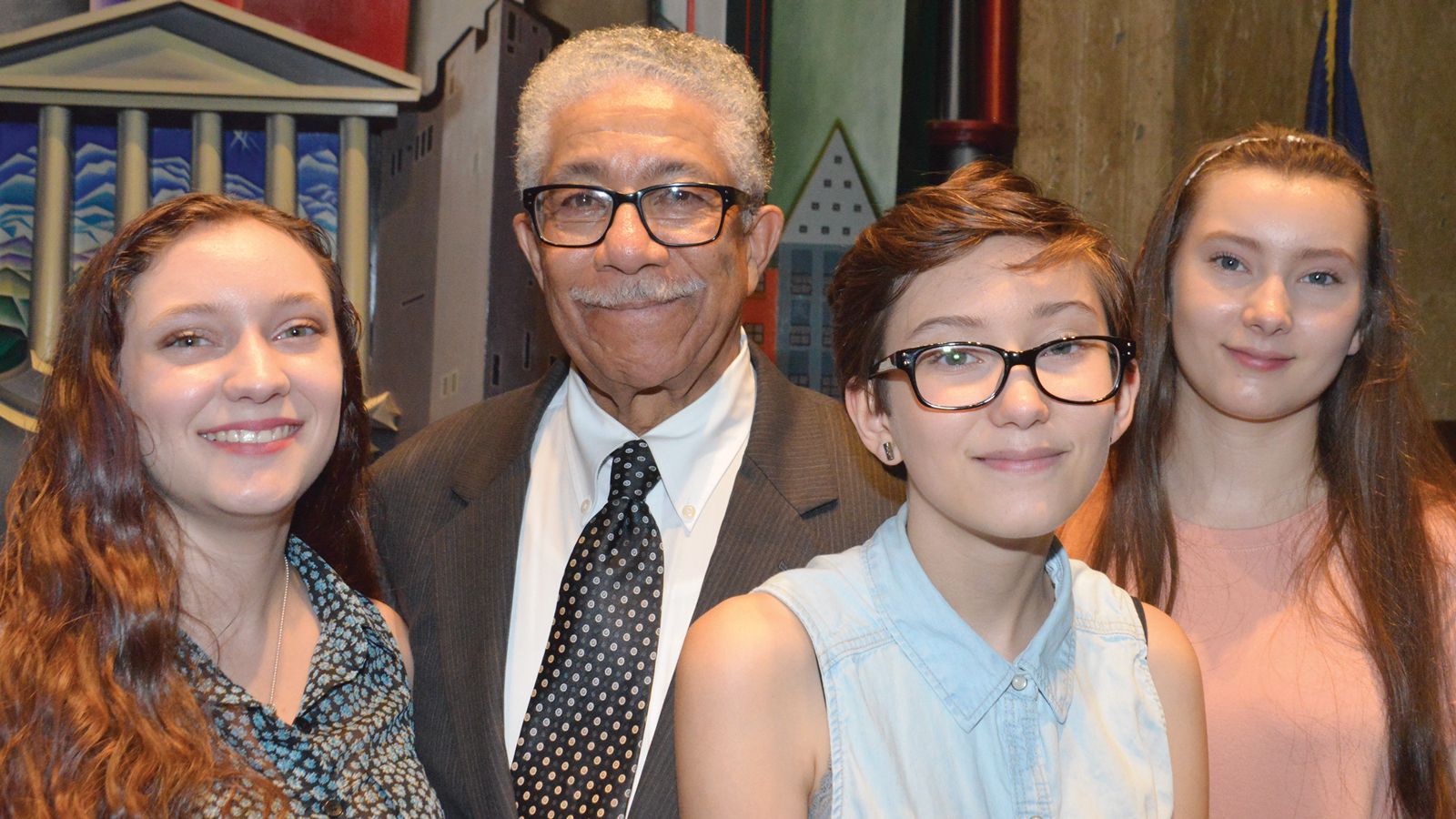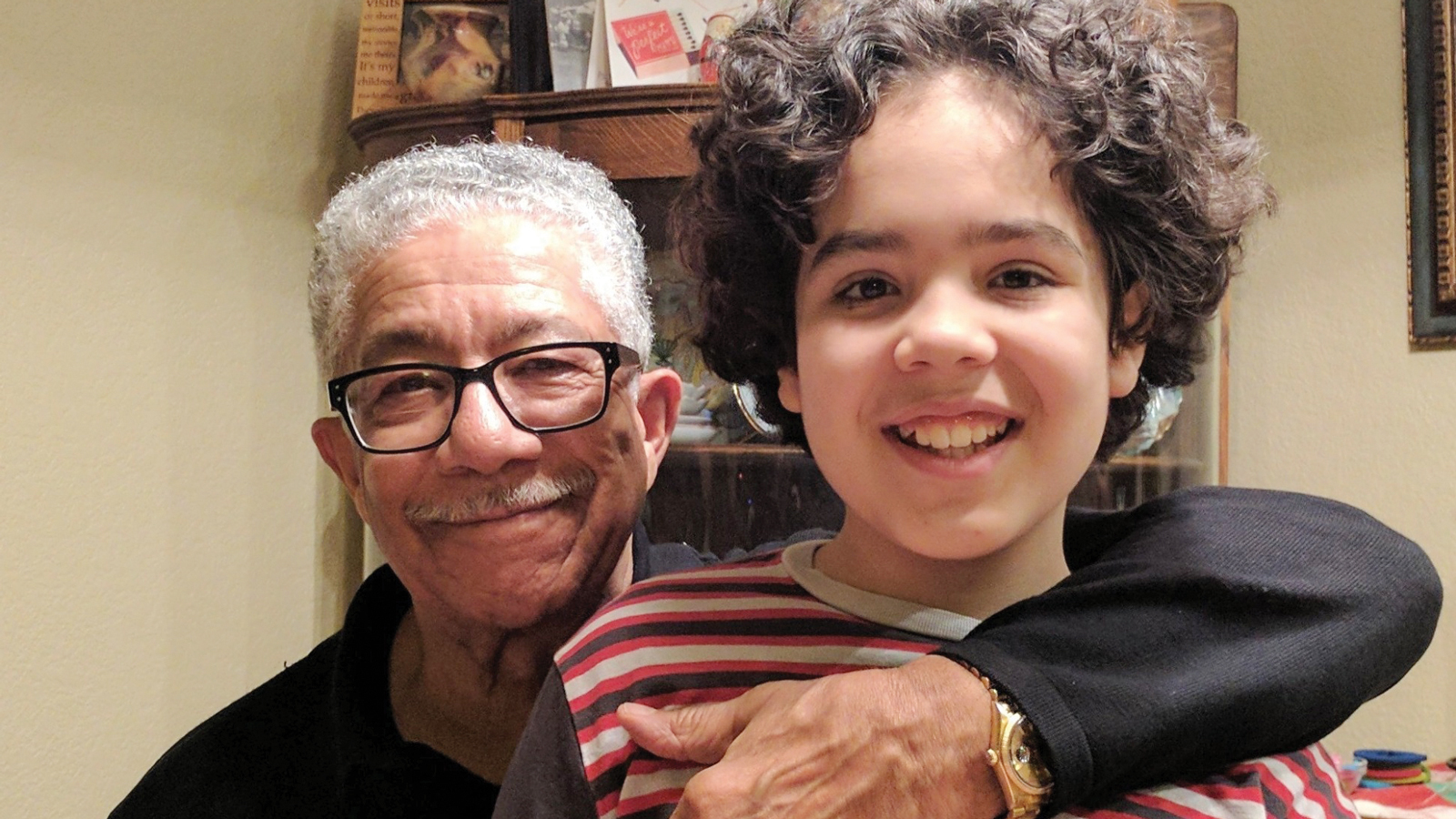
Award of Merit Recipient Judge Alfred Harrell
A Catalyst for Change
November 2020
Download This Article (.pdf)
Throughout his career in the law, the best piece of advice Judge Alfred Harrell has received is that you can’t live your life alone. “You will need help,” he says. “Don’t be afraid to ask for it, and, when you are asked, don’t be afraid to give it.” Harrell has made this a way of life. This year, the CBA recognizes him with its highest honor—the Award of Merit—in recognition of his outstanding service to the legal profession, lifelong dedication to correcting injustices, and unflagging commitment to helping others.1
The Path to Law
Harrell’s commitment to service was first modeled after his stepfather, Irving Andrews. Andrews played a prominent role in the civil rights movement, was involved with the NAACP, and served on the legal defense team for Brown v. Board of Education of Topeka Kansas,2 which established that racial segregation in schools was unconstitutional. Harrell was 7 years old when Andrews came into his life and he “immediately became my hero. I wanted to be just like him. I saw first-hand the impact that he had on so many people’s lives in our community. I always hoped that one day I would be able to have that same type of impact.”
In fourth grade, Harrell would learn what lawyers actually did. “I remember announcing at dinner one evening that I wanted to be a lawyer just like my dad. I never wavered from that declaration.” As a result of his father’s work with civil rights organizations in and around Denver, young Harrell was able to meet Dr. Martin Luther King, Constance Baker Motley, Rodolpho “Corky” Gonzalez, and Minoru Yasui, each introduction affirming his decision to become a lawyer.
History would further impact his decision when, at 12 years old, Harrell learned about the horrific lynching of Emmet Till—who was only 14 years old—in Mississippi. “I recall being very disturbed and frightened by what had happened. My parents sat down with me and explained what was basically going on in our world and especially what was happening to African Americans in the South.” This only fueled his commitment to a career where he might be able to address injustice. In college he joined CORE, the Congress for Racial Equality, and participated in demonstrations and protests. In 1963 he joined the March on Washington, D.C., where Dr. King gave his famous “I Have a Dream” speech.
Transition to Practice
Following law school, Harrell joined his father’s practice in Denver. While law school was good preparation, the difference between study and practice was as wide as the difference between studying the game of chess and actually playing it.
As a young lawyer, Harrell recalls being faced with situations that he thought he should know how to handle. “What I learned was that if I am not the problem, there is no solution.” This lesson, as simple and elegant as a Zen koan, was earned at the expense of a hefty fee from one of his first cases. His client was a former elementary school classmate and they sealed their fee agreement with a handshake. When Harrell was then ordered to get the fee agreement in writing, “I dallied. I was afraid my friend/client would take umbrage.”
The client ultimately received a handsome settlement but changed the agreed upon disbursements. “When I protested, my client related that he had talked to another lawyer and was told that he could adjust the fee since the fee agreement with our office was not in writing. The office lost about $10,000. That may not seem like a lot of money today, but it was 1972—I had just bought my first house for $27,000 and my first year’s salary as a lawyer was $10,000. I realized, after what I then characterized as a debacle, that I had a long way to go before I would be comfortable in the role of lawyer,” Harrell says.
Of course, Harrell went on to become very comfortable in that role until one day Peter Ney, a prominent Colorado lawyer, stopped Harrell in the halls of the Denver City and County building and asked him if he had ever considered becoming a judge. “I replied that I had not entertained that vision, and besides, I was too young to be thinking about the bench. Peter laughed and ultimately persuaded me to give the idea serious consideration. The second time I applied, I was appointed to the Denver County Court.”
Judicial Impact
When asked about memorable cases as a judge, Harrell calls to mind a one-car accident in which the passenger was killed. The two men in the car were firefighters and best friends out doing some last-minute holiday shopping for their families. The roads were wet and icy, and while alcohol was involved, it was clear that neither party was impaired. “The driver was charged with careless driving resulting in death. There was no trial. The driver pled guilty. When I walked into the courtroom for the sentencing hearing, the courtroom was packed from floor to ceiling. The two families, longtime friends, were seated on different sides of the courtroom and I could feel the ice between them. Sentencing took the entire morning. What I remember most about that day was when the families walked out of my courtroom, the ice had melted and many embraced.
“I received several letters of appreciation from members of both families concerning the way they felt about the sentencing. I don’t know that I would call that a proud moment. I do know that I was able to harness all of my experience and knowledge of the human condition to be an instrument and catalyst for the healing of two families. That particular case and numerous other cases like that have given me my most satisfying moments in this profession.”
During his time as a judge, Harrell was also instrumental in building up the American Inns of Court system in Colorado. Modeled after the English legal associations for furthering professionalism, civility, ethics, and legal skills, the first American Inn of Court was brought to Colorado by Harrell’s mentor and friend Judge John Kane, and it was Judge Kane who asked Harrell to get involved in creating the second Inn in Colorado. “One thing I’ve learned about this profession, if someone you highly respect or a mentor asks you if you might be interested in doing something that will elevate the profession, the right answer is always YES!
“When I meekly suggested that I did not have the wherewithal, or the panache that he had in the legal community, he simply chuckled and told me that he had my back and that I might be surprised.” Harrell’s efforts paid off, gaining enough enthusiasm for several Inns of Court—first the Arraj Inn of Court in 1995, then the Thompson-Marsh Inn, the Robert Rhone-Eva Brackett Inn, and the Minoru Yasui Inn a few years later. Most recently, Harrell and his pupilage group at the Rhone-Brackett Inn presented a program on “How to Create an American Inn of Court,” resulting in the creation of the Justice Sonia Sotomayor Inn of Court.
“The Sotomayor Inn is a little different from the other Inns,” says Harrell. Targeting government lawyers in public service and newly minted lawyers, the Inn has a tiered dues system that makes it more accessible to students and new lawyers. Also, instead of meeting at the University Club in Denver, where all the Inns except the Intellectual Property Inn meet, the Sotomayor Inn meets in the Denver metropolitan area courthouses, the Supreme Court, area law offices, and at the two law schools.
Enduring Commitment to Positive Change
Even in retirement, Harrell continues to create new ways for people to relate to and understand each other for the betterment of the legal profession. In 2017, he and Judge Angie Arkin created the Symposium on Race. It came out of a conversation at the Colorado Women’s Bar Association convention. “We were talking about the ‘state of mind’ of the nation at that time. Someone suggested that a lot of the problems that we read about daily could be ameliorated if people would just sit down and talk with one another.” Because no one knew of such a group, “without really thinking,” Harrell suggested they start one themselves. Arkin took him at his word, and the Symposium on Race has been hosting open discussions about race issues for the past several years. Due to the COVID-19 crisis the last in-person meeting was in March; however, in response to member requests, meetings have been held since June via Zoom.
Looking back over 49 years of practice, Harrell has seen many changes and shifts in the state of gender and diversity in the legal profession. “I was the only person of color in the class of 1971 at the DU College of Law. There were two women,” he recalls. When he joined the Denver County Court in 1985, out of 17 judges, two were women, and there was one African American male and one Latinx male. Now 12 of the judges on the Denver County Court bench are women.
These positive changes are in large part a result of fair-minded people determined to correct the imbalance in representation. “When Bill Robbins left the Denver District Court bench in 2018 there were no African American judges on any District Court bench in Colorado. In the last 18 months that has been remedied by a committee formed under the auspices of the Colorado Supreme Court and spearheaded by Denver County Court Judge Gary Jackson to bring to the attention of the appointing authority the lack of minority judges on the Colorado bench. The result is there are now six African Americans on the District Court bench in Colorado, all but one are women,” says Harrell. “If someone one wants to make a change in what I consider a noble profession, I would recommend that if you see something that is wrong, speak out.”
If Harrell’s exceptional career is another link in a chain of positive examples started by his father, then all those Harrell has mentored are further links. “If I have made just one person’s life better because of something that I did or said,” he says, “then I have accomplished my mission in this life.”
Notes
1. The CBA Award of Merit is awarded annually in recognition of outstanding service or contributions to the association, the legal profession, the administration of justice or the community. Judge Harrell receives the award jointly with the late Judge Wiley Daniel, who was profiled in the October 2020 issue. This is the second time in the award’s history when there have been multiple winners, the first being in 1983 with brothers Bernard, Rodger, and S. Robert Houtchens.
2. Brown v. Bd. of Educ. of Topeka Kan., 343 U.S. 483 (1954).




